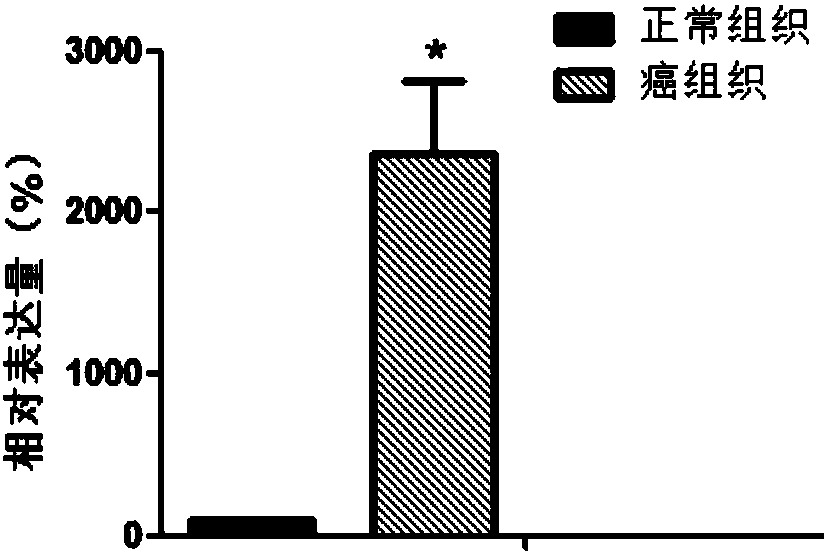Diagnostic marker-C16orf74 gene of renal clear cell carcinoma
A technology of renal clear cell carcinoma and gene, applied in the field of biomedicine, can solve the problems of less than 10% 5-year survival rate, complex pathogenesis and limited curative effect, etc.
- Summary
- Abstract
- Description
- Claims
- Application Information
AI Technical Summary
Problems solved by technology
Method used
Image
Examples
Embodiment 1
[0061] Example 1 Screening of Differentially Expressed Genes in Renal Clear Cell Carcinoma Tissue
[0062] 1. Sample collection
[0063] All 5 cases were ccRCC patients admitted to the Department of Urology of the hospital. The 3 cancer tissue specimens were all frozen in liquid nitrogen tanks 0.5 hours after radical nephrectomy for future use, and the 2 normal kidney tissue specimens were taken from the normal area of T1 renal carcinoma more than 5cm away from the primary tumor. All specimens were confirmed by routine pathological examination, and rechecked by the hospital pathology department before the experiment. All experimental specimens were collected with the consent of the patients or their family members.
[0064] 2. Extraction of total RNA from samples
[0065]About 50-100 mg of the above tissue samples were taken, and Trizol was added to extract total RNA, and the concentration and purity of the samples were measured with a Beckman DU530 ultraviolet spectropho...
Embodiment 2
[0075] Example 2 Verification of Differentially Expressed Genes in Large Samples
[0076] The C16orf74 gene, which was suggested to be differentially expressed between clear cell renal cell carcinoma tissue and normal kidney tissue by high-throughput sequencing, was selected as the research target for large-scale validation.
[0077] 1. Tissue acquisition and processing: 45 cases of renal clear cell carcinoma tissues and 45 cases of normal renal tissues were collected according to the method in Example 1.
[0078] 2. RNA extraction
[0079] RNA extraction was carried out according to the method of Example 1.
[0080] 3. cDNA synthesis by reverse transcription
[0081] Take 2 μg of total RNA, add 5 μl T7 promoter primer, add nuclease-free water to a total reaction volume of 11.5 μl, bathe in water at 65°C for 10 minutes, place on ice for 5 minutes, then add 8.5 μl cDNA Master Mix (containing 5x first strand Buffer 4μl, 0.1mol / L DTT 2mol / L. 10mol / L dNTP mixture 1μl, reverse t...
PUM
 Login to View More
Login to View More Abstract
Description
Claims
Application Information
 Login to View More
Login to View More - R&D
- Intellectual Property
- Life Sciences
- Materials
- Tech Scout
- Unparalleled Data Quality
- Higher Quality Content
- 60% Fewer Hallucinations
Browse by: Latest US Patents, China's latest patents, Technical Efficacy Thesaurus, Application Domain, Technology Topic, Popular Technical Reports.
© 2025 PatSnap. All rights reserved.Legal|Privacy policy|Modern Slavery Act Transparency Statement|Sitemap|About US| Contact US: help@patsnap.com

